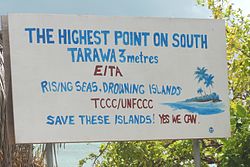
Countries/territories not shown on the map: Antarctica (aq) (continental disputed territory), Australia (au) (continental country), the Cook Islands (ck) (free association with New Zealand), Greenland (gl) (constituent country of the Kingdom of Denmark), Niue (nu) (free association with New Zealand), and Puerto Rico (pr) (unincorporated U.S. territory).
An island country, island state, or island nation is a country whose primary territory consists of one or more islands or parts of islands. [1] Approximately 25% of all independent countries are island countries. [2] Island countries are historically more stable [2] than many continental states but are vulnerable to conquest by naval superpowers. Indonesia is the largest and most populated island country in the world (and the fourth most populated country overall). [3] [4]
Contents
- History
- Prehistory
- Modern times
- 20th century
- Politics
- Island territories
- War
- Natural resources
- Geography
- Climate change
- Economics
- Composition
- See also
- References
- External links
There are great variations between island country economies: they may rely mainly on extractive industries, such as mining, fishing and agriculture, and/or on services such as transit hubs, tourism, and financial services. Many islands have low-lying geographies and their economies and population centers develop along coast plains and ports; such states may be vulnerable to the effects of climate change, especially sea level rise [ citation needed ].
Remote or significant islands and archipelagos that are not themselves sovereign are often known as dependencies or overseas territories.


